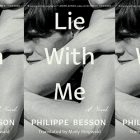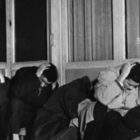The Relationship Between the Military and Language in Look and Hard Damage

In the past five years, we have seen the publication of two major debut poetry collections that critique U.S. intervention in South West Asian and North African (SWANA) countries: Solmaz Sharif’s Look (2016), on Iraq-U.S. and Iran-U.S. relations, and Aria Aber’s Hard Damage (2019), on Afghan-U.S. relations. Both Look and Hard Damage are books of witness. Sharif’s opening (and title poem) elucidates her intention to study war and the human suffering that follows: “Let me look at you,” she writes. “Let me look at you in a light that takes years to get here”—“light” here referring to the Hellfire missile. Aber echoes this in Hard Damage: “[W]hat I need to know is how to say non-nuclear / without having to say azalea, azalea, azalea”—without the need to cushion or euphemize—“To look at a page without looking // away.” Within and beyond this witnessing, these books interrogate the military-industrial complex’s relationship to everyday civilian language.
“Daily I sit,” Sharif writes in “Personal Effects,” “with the language / they’ve made // of our language.” This statement is in reference to the 2007 Department of Defense’s Dictionary of Military and Associated Terms, which is available online as a 770-page PDF. The military dictionary, as we see again and again in Look, is largely euphemistic. It takes otherwise uncharged everyday language and inserts it into military contexts. For “a period during which a mine circuit is receptive of an influence,” for example, the dictionary takes the term “look,” a word whose definition is otherwise as benign as a blink. For “drop one or more aerial bombs or aerial mines onto the surface from an aircraft,” the dictionary takes the term “lay,” elsewhere a position of rest. “Airborne data link equipment” becomes a “dolly,” otherwise a child’s toy and comfort. The schism between civilian and military definitions for the same word is jarring. That’s the point. The rhetorical use of euphemism is to linguistically deemphasize the real-life violence by calling it something softer. It attempts to separate the speaker of the euphemism from the act of violence itself. The effect of inserting everyday language into military contexts, Look suggests, is a normalization of violence.
Of course, the relationship between the military and language is bidirectional; recurring insertion of militarized language into everyday contexts normalizes violence too. It also emphasizes the military’s overwhelming presence in, surveillance of, and influence over the private sphere. “Safe house,” for example, is a poem primarily concerned with domestic interactions between the speaker and her father. The poem also mirrors the form of the military dictionary, each stanza organized by term entry in capitalized font. From the poem’s title “Safe house,” which the Department of Defense defines as “[a]n innocent-appearing house or premises established by an organization for the purposes of conducting clandestine or covert activity in relative security,” the poem primes the audience to proceed with suspicion, a reading that the third line rewards when the speaker’s tone veers toward investigative reporter or informant. Thinking about a past conversation with her father, she “scan[s] [her] memory of baba talking on / screen” and “search[es her] father’s profile.” Despite their benign everyday definitions, “scan,” “search,” and “screen” contextually become, foremost, military terms in this poem. When the speaker “scan[s her] memory of baba talking on / screen” and “search[es her] father’s profile,” the military dictionary states that she is, by military definition, “looking for a target.” Her father, by military definition, becomes “an enemy force” who is not simply on the other side of a phone screen but, by military definition, is in “camouflage.” Here the military definition becomes denotation—the civilian term a receding connotation—in a description of what otherwise might seem like an intimate domestic moment between father and daughter. That a military operational definition is able to take on a civilian word as euphemism and then replace the original civilian word’s definition with its own forefronts Look’s observation that the military-industrial complex is a behemoth influence on the language we use to make sense of the world around us. “This is fascism,” Sharif writes elsewhere in another poem called “Force Visibility.” Fascism is the everyday: “Dinner party / by dinner party, // waltz by waltz.”
Aber’s poems in Hard Damage also see the everyday through the vocabulary of war: snow becomes “grenades of tear gas thrown across / a barbwire fence” in “First Snow”; when she describes place, “shampoo” holds equal weight with “nuclear waste” and “missile” in a list divided by commas in “Here”; her hair is a “Taliban Beard” in “Ode to My Hair”; her homesickness is not just homesickness—it is “militarized / homesickness” in “There.” As Aber implies in “Can You Describe Your Years in Prison?” she has never had “one glass of water that did not / contain war.” Aber’s project is not to write parallel to Sharif from an Afghan perspective. (Although, if it were, I would applaud that mission, as it fills a need in U.S. literature.) “This is what I want to excel in,” Aber writes instead, “gardens, elixirs of thought, // no one draping the stench of severed limbs.” Writing this article in a time during which the general American public still sees police abolition as impossible, Hard Damage is a radical project to imagine a future without militarized language—which is to say a future without war.
In Hard Damage, mishearings become transformations of language that always leads to the possibility of a better outcome: in “How to Pronounce John Frusciante Correctly,” Aber writes that she has “entered a language / wherein [she] mistake[s] / I will leave you” for / I will love you.” When others ask her mother, in “Reading Rilke in Berlin,” “where are you from?”—a question often coupled with “Go back home”—her mother mishears and responds, “fine, ou hare yu?” which allows us to consider a world in which the speaker does not “[absolve] every year around the sun / knowing that there is an animal smelled hooked / to a line leading past a border I am / not going to cross.” That is, there is the possibility of a future in which strangers do not feel entitled to others’ nationalities or in which strangers care foremost about state of being over state of origin. When the speaker comes across the term “the Mother / of All Bombs” in “Azalea Azalea,” it is followed by the question, “Mother, what is the order / of violence?” The term later reappears when the speaker reimagines the phrase as “The Mother of All Balms,” connoting healing rather than destruction. This same poem, “Mother of All Balms,” reimagines the book’s prior recurring statement that the mother has been to prison as “She was in prism,” the word “prism” denoting crystal, and the phrase “in prism” taking on a fabulist connotation. “Even trauma,” Aber writes in “Reading Rilke at Lake Mendota, Wisconsin,” “sounds like Traum, / the German word for dream.”
“It matters what you call a thing,” Sharif writes in “Look”; “Into English I splintered,” Arber echoes in “Reading Rilke in Berlin.” These lines respectively begin the two writer’s collections. They make good on their claims. Reading Sharif and Aber in concert, look serves as a project that inscribes the militarization of everyday language and its consequent normalization of violence, groundwork that allows for a radical project like Aber’s to exist. In reimagining the relationship between language and military that we see in look, Hard Damage reimagines a world in which war does not pervade our lives.



